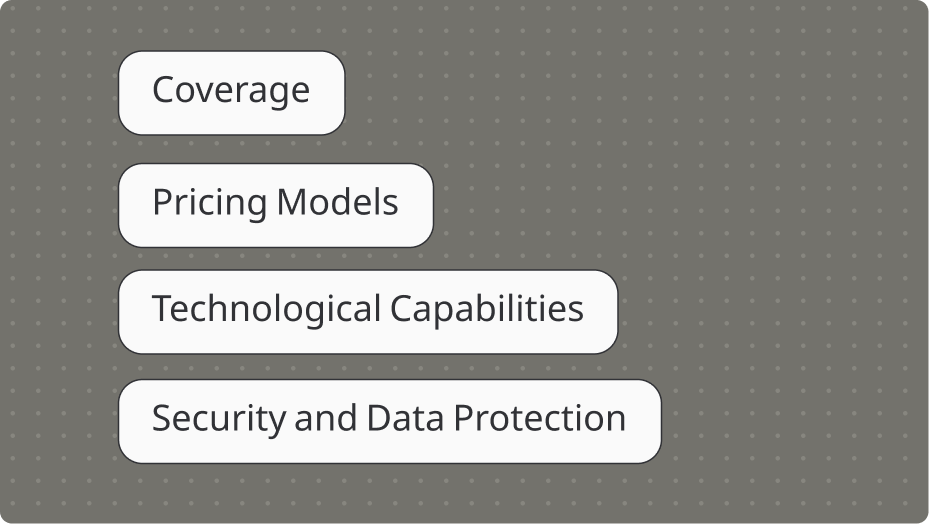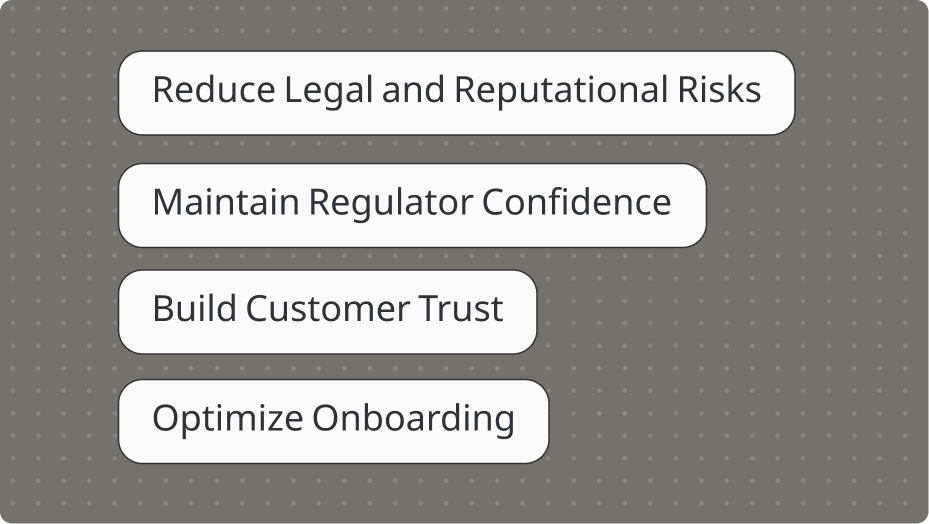Brokerage Business
9 minutes read
Oct 29, 2024
Why Is KYC Important for Brokerage Platform?
What is KYC?
Know Your Customer (KYC) refers to the process of verifying customers’ identities, locations, and attributes. It involves collecting and analysing personal details and identification documents to confirm who the customer claims to be. The goal is to prevent financial fraud, money laundering, and terrorist financing.
KYC regulations originated in the late 1980s as anti-money laundering laws were introduced. Several high-profile cases underscored the need for more robust customer identification checks. Various international bodies later devised common global standards that many jurisdictions have locally adopted. Today, KYC is a core compliance requirement for most financial institutions.
When performing KYC, companies collect a customer’s name, physical address, date of birth, and identification information. This may include their government-issued ID, taxpayer ID number, photo ID, and proof of their address. Additional details like occupation, source of funds, or expected transaction volumes are also gathered. The collected know-your-customer data is screened against internal and external watch lists for any matches or suspicious patterns.
KYC provides multiple benefits. It helps ensure only legitimate account holders with independent financial means access services. This shields firms from legal penalties due to being unwittingly used for criminal plans. For customers, know-your-customer processes build assurance they are dealing with reputable, well-regulated counterparts. Regulators gain confidence that protected sectors aren’t vulnerable to financial system abuse.
How KYC Works for Users
Opening an Account
Once you’ve chosen a brokerage, you can begin the account opening process. You’ll need to submit a completed application form providing basic details like your name, date of birth, contact information, etc. The form is available on the brokerage’s website or mobile app.
Required Documentation
To verify your identity and address, you will need to provide relevant document proofs. This includes a government-issued photo ID like a passport or driver’s license. For address verification, utility bills or bank statements from the last 3 months are typically required. Some brokerages may need additional documents based on your location or transaction levels.
Document Submission
You can submit the required KYC documents by uploading scanned or photographed copies through your brokerage account. Make sure the uploaded files are clear with details like photos, signatures, and watermarks visible. Some brokerages also allow physical document submission by post.
Verification Process
Once submitted, brokerage compliance teams will verify the information against internal and external databases. This includes matching ID photos, checking for duplicates, and screening against watch lists. Most verifications are automated but some may require manual reviews. Primary identifications are cleared quickly while additional checks can take 1-5 business days.
Approval and Monitoring
If verification is successful, your account will be approved for use. However, ongoing monitoring also occurs, especially for high-risk customers. Your compliance with KYC processes is reviewed periodically. Failure to update documentation as needed could lead to account restrictions.
User Experience
Leading brokerages offer user-friendly digital KYC submissions with online/mobile uploads. This provides a convenient experience for customers while streamlining back-end processing. Real-time status updates also enhance transparency compared to physical document-based KYC.
Who are KYC Providers?
As financial regulations have increased in complexity, specialized KYC providers have emerged to assist businesses in fulfilling compliance requirements. These external companies offer identity verification and customer due diligence services as their core function.
KYC verification involves scrutinizing voluminous documentation and screening for potential issues – a tedious task when not your core business. Outsourcing this to credentialed firms allows internal teams to focus on strategy while leveraging expert analysts. Providers gain unmatched experience reviewing millions of documents globally.
Typical services include digital identity proofing using government IDs and biometric data, electronic verification of submitted documents, background checks and watchlist screening, risk-based assessments flagging anomalies, and document validation. Some also provide monitoring tools.
This approach offers increased accuracy from AI-powered verification and access to more extensive sanction lists. It ensures uniform compliance standards and turns a fixed cost into a variable one based on business volumes. Selecting a reliable partner spares the hassle and risks of managing verification in-house.
Before onboarding, due diligence validates a provider’s certifications like the TM UKBA for digital identity or ISO 27001 for security. References from existing customers supply feedback on service quality. Other assessment factors cover technological capabilities, geographic remit, pricing models, and customization support provided.
Key Selection Factors for a KYC Provider

Coverage
A provider with a database incorporating IDs from over 200 countries would suit internationally-focused firms best. Comprehensive coverage especially across peculiar document formats used in emerging markets enhances verification success rates globally. Real-time access to identity attributes from authoritative sources worldwide guarantees frictionless onboarding regardless of customer location.
Pricing Models
Affordable flat and tiered pricing balanced against quality of service is important. Volume-based pricing transferring fixed verification costs to flexible variable ones based on actual transactions is ideal to scale with business growth. Subscription packages providing unlimited verifications or support bundles offer further savings. Free or competitive technology integration lowers overall compliance expenditures.
Technological Capabilities
Automating identity verification through digital channels expedites onboarding. AI-powered tools detecting subtle photo mismatches or document anomalies boost accuracy. Systems accommodating multi-format uploads via mobile and desktop streamline submissions. Real-time validation status updates maintain transparency. System uptime over 99.5% guarantees seamless verification. Lifelike Liveness Checks using photo and video analysis foil spoofing attempts.
Security and Data Protection
Compliance with leading standards like ISO 27001 demonstrates adequate safeguards over sensitive customer data. Access restrictions, encryption in transit and at rest, audited infrastructure, and incident response policies offer robust security assurances. Data sovereignty and minimal retention help satisfy various privacy regulations worldwide.
Top 5 KYC Solution Providers
1. Shufti Pro
Shufti Pro is one of the leading KYC providers, known for its AI and hybrid technology. It offers a comprehensive suite of services including identity verification, document verification, biometric authentication, ongoing monitoring, age verification, and touchless security.
With a global client base, Shufti Pro verifies identities in over 230 countries and supports over 14,000 ID types in multiple languages. Its highly accurate biometric facial recognition and liveness detection features set it apart. The company is certified as GDPR compliant and scored high marks on privacy and security standards like PCI DSS and Cyber Essentials.
Shufti Pro’s simple and low-cost API integration model allows businesses of any size to leverage its solutions. Its multi-layered approach against digital identity theft and financial crimes positions it as a top choice for industries such as e-commerce, fintech, and education.
2. Trulioo
Trulioo is a leader in global digital identity verification. It provides access to millions of public and proprietary identity records worldwide through its unified platform. Trulioo supports cross-border verification needs, covering over 195 countries. With capabilities to authenticate over 10,000 ID types, it delivers seamless onboarding experiences.
Trulioo is highly rated for the flexibility and customization its solutions provide. Businesses can configure tailored rules and integrate the API according to specific needs. This makes Trulioo a preferred partner in industries like banking, payments, and crypto that require scalable KYC.
3. Jumio
Jumio specializes in AI and biometrics-based identity verification. It has authenticated over 250 million individuals in over 200 countries and regions. Jumio’s KYX Platform conducts ID document verification in under a minute on average at 99% accuracy. The solution supports identity proofing on both mobile and desktop.
Jumio is well-recognized with features like its user-friendly interface, multilingual abilities, and PCI DSS security compliances. Leading companies in finance, gaming, and travel trust Jumio for fast and reliable KYC.
4. Onfido
Onfido deploys AI-powered identity verification and uses machine learning to further improve accuracy over time. Its real-time identity checks combine document and biometric authentication to establish true user identities. Onfido caters to businesses of all sizes by offering SDKs, APIs, and no-code orchestration tools.
Onfido sees wide success with its seamless digital experience and accurate fraud detection. It upholds high security and privacy standards meeting regulations globally.
5. iDenfy
iDenfy provides worldwide identity verification and covers over 3,000 ID document types from 200 jurisdictions. It offers direct integration of PEPs, sanctions, and adverse media screening for continuous monitoring. iDenfy conducts risk-based due diligence with report-generation tools.
iDenfy upholds fast and accurate verifications while ensuring privacy and security. Its flexible API integration supports organizations of all sizes globally through each stage of the customer lifecycle.
Importance of KYC for Brokerages

Reduce Legal and Reputational Risks
Robust KYC helps brokerages only do business with legitimate, law-abiding clients. Verifying customer identities and screening for suspicious attributes prevents unintentionally facilitating financial crimes. This shields the brokerage from legal liabilities and associated costs like fines from authorities and chargebacks that often run into millions.
Rigorous KYC also protects brand reputation. Brokerages avoid negative publicity from being linked to unlawful activities including money laundering if proper customer diligence had barred such actors. Reputational damage plunges client trust and new business for years. KYC thus becomes a vital risk mitigation strategy for brokerages.
Maintain Regulator Confidence
Regulators evaluate KYC programs to ensure brokerages effectively fulfil anti-money laundering obligations. Comprehensive customer due diligence demonstrates the steps undertaken to minimize financial system abuse risks. It reassures regulators the brokerage prioritizes oversight compliance.
Robust KYC assists cooperation with regulators by identifying areas needing controls and proactively resolving issues. This maintains positive relationships vital for approvals in pursuing growth areas. KYC also assists in justifying licensing applications by depicting professional processes well-regulated entities must follow.
Build Customer Trust
Transparent KYC establishes the brokerage as legitimately serving clients after extensive screening. Customers feel assured their provider conducts comprehensive verification before engagement rather than superficially. This conveys the brokerage’s commitment to transparency and responsible business conduct.
Clear communication of KYC requirements builds familiarity and willingness from customers to smoothly submit verification documents. They appreciate measures taken to keep the platform protected from illegal manipulations as it directly impacts their trading safety. Overall, diligent KYC fosters reassurance and a positive perception of the brokerage.
Optimize Onboarding
Streamlined KYC improves the customer registration experience. Simplified document lists and digital upload options expedite submissions. Integration with specialized KYC solution providers processes thousands of verifications per minute.
Automated verification status updates maintain transparency. Partial verifications let low-risk applicants start using limited basic services pending full clearance. These enhancements attract more users by resolving common pain points of prolonged paper-based KYC.
Conclusion
Adhering to comprehensive KYC verification isn’t just a means to pay lip service to regulations. It is a prudent risk management exercise for brokerages seeking to avoid being entangled in money laundering or financial fraud through unwitting assistance. Focusing on due diligence keeps offerings legitimate and secures regulator approval central to future business growth. Choosing a tried KYC verification specialist expedites onboarding while sustaining verification vigour protective for all stakeholders long-term. With KYC standards continually progressing worldwide, proactive not passive compliance stays the requirement brokerages ignore only at their own risk.
FAQ
119

Written by Ivan Bogatyrev
Business Development at FintechFuel
Writing about the exciting worlds of iGaming and the brokerage business, breaking down the latest trends and insights. Making complex topics easy to understand, helping readers stay informed and ahead of the curve.
More by authorRead more

Brokerage Business
10 minutes read
Sep 30, 2025
The brokerage industry in 2026 is entering a new phase shaped by technology, regulation and shifting client demands.


